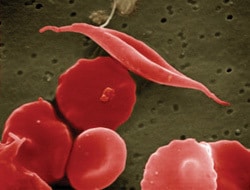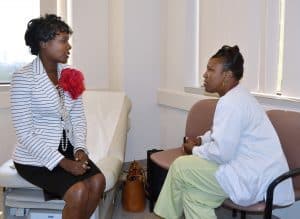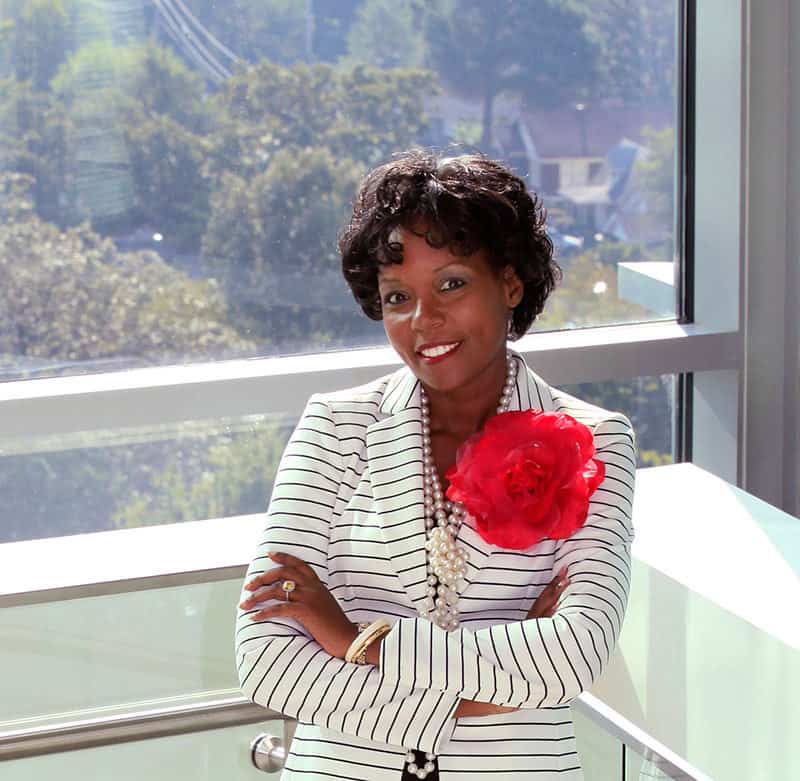Woman with Sickle Cell Disease Finds Help at UAMS
| Sept. 22, 2015 | Today newborns in Arkansas are tested for sickle cell disease and other disorders before they leave the hospital.
That wasn’t the case when Little Rock resident Phyllis Dickerson was born in 1964. The lack of testing, paired with a fairly healthy childhood, meant she wasn’t diagnosed with the disease until she was 13 years old, when she was scheduled to undergo surgery.
“Because of the surgery, they had to do labs. It was in that lab work that they realized I had sickle cell disease,” she said. “I was a late bloomer to sickle cell.”

People with sickle cell disease have red blood cells that contain mostly hemoglobin* S, an abnormal type of hemoglobin. Sometimes these red blood cells become sickle-shaped (crescent shaped) and have difficulty passing through small blood vessels.
Sickle cell disease is an inherited disorder that affects red blood cells, which travel throughout the body carrying oxygen. For a person with sickle cell disease, abnormal hemoglobin in the red blood cells turns those cells sticky and hard. The normally round cells also become Crescent-shaped, resembling a farm tool called a sickle.
The misshapen red blood cells have difficulty travelling through narrow blood vessels. Those vessels can become plugged, causing pain and damaging organs by depriving them of oxygen. Sickle-shaped cells also die sooner than normal red blood cells, resulting in anemia.
The disease is most prevalent in the African-American community, although other people are at risk, including those of Hispanic, Middle Eastern and Mediterranean descent. According to the Centers for Disease Control, an estimated 90,000 to 100,000 Americans are living with sickle cell disease, including as many as 1,200 Arkansans.
After her diagnosis, Dickerson sought treatment at Arkansas Children’s Hospital’s pediatric sickle cell clinic. Upon reaching adulthood, she, like other adult sickle cell patients in Arkansas, returned to a primary care physician for treatment.
Treatment options for adults with the disease changed in January 2014 when UAMS opened the Adult Sickle Cell Clinical Program. In addition to treatment, the clinic offers support groups as well as a help line that patients, their families and physicians can call with questions about the disease.
The help line is staffed 24 hours a day, seven days a week and can be reached at 1-855-Sic-Cell (742-2355).

Phyllis Dickerson (left) talks with Stella Bowers, R.N., during a checkup at the UAMS adult sickle cell clinic. The UAMS clinic is the first one in Arkansas that specializes in treating adult sickle cell patients.
“Before this clinic, adult patients really didn’t have a central place where their specialty is adult sickle cell care,” said Stella Bowers, R.N. “So it has given them somewhere to go that is focused on them and their adult sickle cell problems.”
Dickerson, who works for the city of Little Rock as the special events and programs coordinator, visits the clinic yearly.
“I’m really blessed. I only come to the clinic once a year,” she said. “I have a yearly checkup and I pass all of my tests, and I get to go home.”
If she has a question about her health at other times of the year, she simply calls the clinic.
“One thing I really like about the clinic is I can send a text message, I can send an email, and they respond immediately to my question. I don’t have to wait,” she said, adding that if she needs to see a doctor, they get her in quickly.
Earlier this year, Dickerson needed a blood infusion – her first in 30 years. During the procedure, she noticed that the blood she was receiving came from Washington, D.C.
Bowers said that is because it isn’t enough to just match blood type for sickle cell patients. Other factors such as antigens and antibodies come into play, making it more difficult to find a perfect match.
Such specificity makes it even more important for African-Americans to donate blood, Bowers said.
As part of Sickle Cell Awareness Month, the clinic partnered with Sickle Cell Support Services, an Arkansas nonprofit that assists patients with sickle cell disease, for a blood drive Sept. 12 at the Greater Friendship Church in Little Rock.
